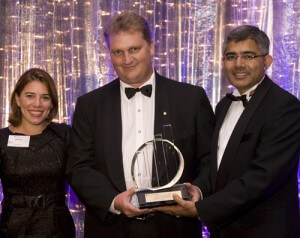Andrew Muir, CEO of The Wilderness Foundation (WILD’s sister organization in South Africa), has been named the Ernst and Young Social Entrepreneur for 2012. Andrew, a globally recognized leader in the urban social aspects of nature conservation, is also a Rolex Award Laureate (2008) for his visionary work to assist AIDs-affected and other disadvantaged orphans by providing care and training to facilitate jobs for them in the nature conservation sector.
Muir was one of four finalists selected for the 2011 Ernst and Young World Entrepreneur Awards Programme in the Social entrepreneur category. He was at the ceremony to receive the award.
“This award will help us to build on what has already been established with regards to the Umzi Wethu program as well as our other social investment programs. We will have access to the Schwab Foundation’s global network, providing unprecedented opportunities to engage global decision makers,” says Muir.
“I believe that our main strength as a foundation is the integration of social intervention and environmental sustainability. We are not just a conservation-oriented organization. The Wilderness Foundation recognizes that the sustainability of South Africa’s wild lands and wilderness is intrinsically dependent on its social and economic sustainability.”
According to Ajen Sita, CEO for Africa at Ernst and Young, the company has been recognizing successful entrepreneurs through the program for the past 14 years. “We are humbled to be associated with and award these individuals who are making a remarkable difference to our economy and the societies which we operate and live in. We congratulate all finalists for their exceptional performance.”
The Umzi Wethu program transforms vulnerable youth, affected by poverty and HIV/Aids with a skills development and job placement into highly employable young adults with sustainable futures. Since 2006 a total of 107 students have graduated- 64 being Hospitality students and 43 Game Ranging students. The job retention rate of Umzi graduates is about 85% and placement rate is 94%, with 85% currently employed despite the challenge of an ecotourism industry set back by the recent global financial crisis. This is particularly significant as 50% of all our students are HIV/AIDS orphans who are especially affected by the effects of HIV/AIDS and violence that accompanies the deep poverty of communities from which they come. In addition 10% of graduates have advanced to junior and middle management positions in eco-tourism industries and five have been enabled to pursue tertiary education.

